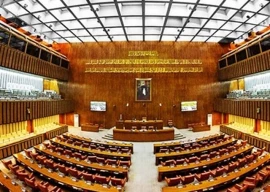
This has been revealed in an eight-page written order in a suo motu case pertaining to retrieving the alleged ill-gotten money from foreign accounts.
The three judge bench, headed by Chief Justice of Pakistan Mian Saqib Nisar in its order has noted that the court on March 26 constituted a committee of 12 experts having insight into the process of accumulation of undeclared foreign assets by Pakistani citizens. They were tasked with deliberating and recommending legislative and executive measures for tracing and retrieving such assets held abroad. A final report of the committee was submitted on April 13 to the court.
Hopes dashed for assets recovery from abroad
The committee comprised Governer State Bank Tariq Bajwa, Chairman FBR Tariq Pasha, Additional Attorney General Mohammad Waqar Rana, senior lawyer Khalid Anwar, Advocate Ikramul Haq, Finance Secretary Arif Ahmed Khan, Shabbar Zaidi, Mehmood Mandiwala, Bashir Ali Muhammad, Tariq Paracha, Nisar Muhammad Khan
According to the order, the report has highlighted that during the financial year 2016-17 a staggering amount, US$15.253 billion, was transferred abroad by Pakistani citizens through normal banking channels. The committee also suggested that during the said period a substantial amount of transfers took place from Pakistan under unauthorised and undocumented Hundi and Hawala mechanisms.
“Clearly, both types of outflows have a huge impact on the stability of foreign exchange reserves of the country and adversely affect exchange rates of the Pakistani Rupee. Also as a result, the national economy becomes vulnerable to pressure due to foreign currency obligations and can suffer undue and disruptive inflation eventually draining the exchequer of substantial amounts of tax on account of escaped income and wealth”
The order says that the apex court is not an 'expert in economic, fiscal or financial matters', adding that it was persuaded to initiate these suo motu proceedings for the grave public interest concerns: firstly, regarding the declining foreign exchange reserves of the country, depreciating exchange rate and the corresponding inflationary trend of imported essential commodities; and secondly, by the governmental indifference towards the unhindered outflows of valuable foreign exchange from the economic wealth and resources of the country encouraged by immunities from scrutiny and from taxation granted to foreign currency transfers abroad that were also depriving the exchequer of vital tax revenue.
CJP takes suo motu notice of laundered money in Swiss accounts
Accordingly, the court said that these proceedings have aimed to draw attention of the federal legislative and regulatory bodies toward key issues pertaining to the aforementioned matters of national priority.
“No challenge to the provisions of different legislative and regulatory initiatives undertaken in the matter by the government is presently before the apex court. Also we are not prescient about subtle technicalities of foreign exchange and balance of payment stabilisation nor about fiscal or other economic matters so as to anticipate deficiencies in the Federal Government’s actions” Likewise, the order says that in absence of a concrete challenge, the top court is not inclined to unilaterally sit in academic judgment on the legality or propriety of the provisions of the scheme of voluntary disclosure of foreign assets under the Act, 2018.
The SC in its order said that any measures taken by the Federal Government in the public interest to protect the foreign exchange reserves of the country and to bring the hitherto undeclared foreign assets within the tax net are welcomed by the Court.
“Nevertheless, there are other deficiencies of the current tax laws and in the regulatory framework for the holding and transfer of foreign exchange that promote the accumulation of undeclared foreign assets and corresponding income. These have been highlighted by the Committee but remain unaddressed by the Federal Government. They require careful attention and deliberation by the concerned authorities”
Earlier, the committee in its report had noted that the experience of incentive schemes floated in other jurisdictions to encourage voluntary disclosure of foreign assets. These include schemes initiated in the recent past in Italy, India and Indonesia. It is stated that the Tax Amnesty Scheme, 2016 offered in Indonesia was highly successful and the Committee supported its emulation in Pakistan.
-(14)1720679028-0/(image-blakelively-on-Instagram)-(14)1720679028-0-405x300.webp)

1731028448-0/Untitled-design-(37)1731028448-0-165x106.webp)







1730379446-0/WhatsApp-Image-2024-10-31-at-17-56-13-(1)1730379446-0-270x192.webp)






COMMENTS (4)
Comments are moderated and generally will be posted if they are on-topic and not abusive.
For more information, please see our Comments FAQ